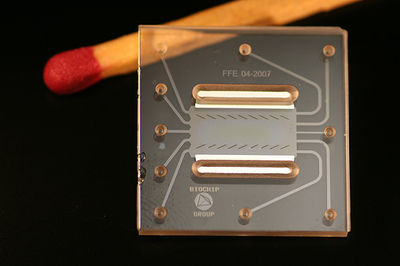Microfluidics
Main > Food and Agriculture > Pests and weeds
Analytical devices can be produced at very low cost from simple materials. Applications are as vast as they are revolutionary, and include medical tests, environmental sensing, agriculture, soil science and many more. Microfluidics refers to a set of technologies that control the flow of minute amounts of liquids or gases — typically measured in nano- and picoliters — in a miniaturized system. With these "chips", room-sized diagnostic testing equipment can be shrunk down to the size of a postage stamp. This is also called "lab-on-a-chip".
Materials and Equipment Used
Consumables:
- blotter paper
- regular paper
- wax paper, shrinky-dink
- transparency film
- cotton thread
- sewing needles
- wood sticks
- Jell-O
- beeswax?
Equipment:
- syringes
- cell phone cameras
- plastic lenses for cheap microscopes
- Laser cutter, see Low-cost rapid prototyping of flexible microfluidic devices using a desktop digital craft cutter
Applications
- medicine: immediate testing ("point-of-care"), genetic testing and research, pathogens
- agriculture: soil nutrient testing (biosensor example here), plant breeding, pests (genetic testing), nutrition. Controlled-environment growing can use microfluidic chips to monitor for DNA snippets associated with plant diseases.
- environmental sensing: water testing, air quality, toxins
- geoscience: soil science, mining
- materials: chemical separation and reactions
- energy: development of biofuels
George Whitesides, Harvard University
In his legendary career in chemistry, George Whitesides has been a pioneer in microfabrication and nanoscale self-assembly. Now, he's fabbing a diagnostic lab on a chip.
Further Reading
- Disposable microfluidic devices created using regular wax paper
- Shrinky Dink® microfluidics - academic paper here
- Wikipedia: Microfluidics and Lab-on-a-chip
- DIY Bio
